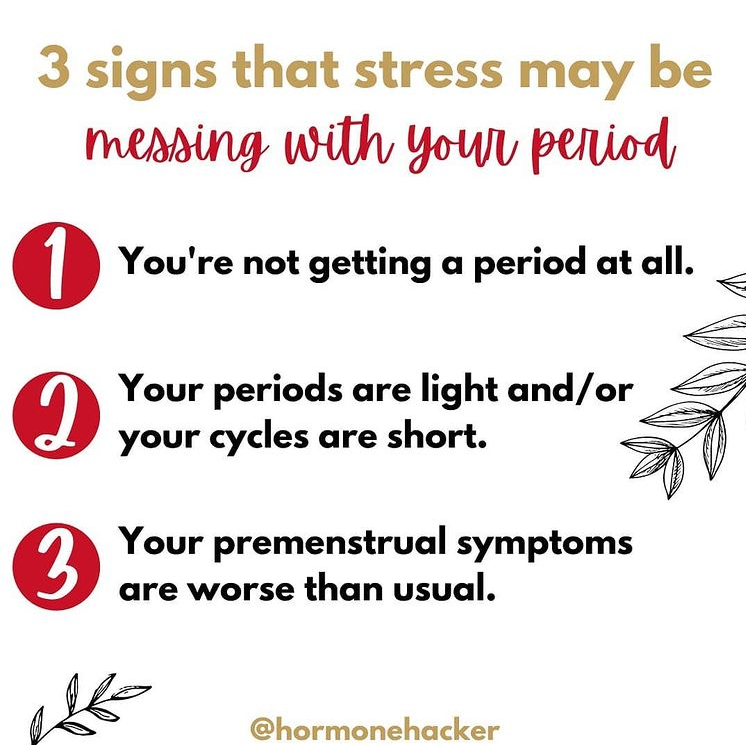Your reproductive system is pretty smart when it comes to stress.
Whether you’re training for a race, going through a rocky patch in a relationship or cramming for important exams, your body notices excessive stress— and it could reflect in your period (or lack thereof).
Both mental and physical stress can create period problems. A few examples…
MENTAL STRESS:
Major life changes
Relationship issues
Expectations at work or school
Grief
Lack of coping mechanisms
PHYSICAL STRESS:
Increasing amounts of exercise
Insufficient calorie intake
Too low body fat percentage for you
Being sick
Travel
Your fertility works in cycles.
In order to have a period, you must ovulate (release an ovum, or egg) first. Stress— specifically in the form of increased cortisol— inhibits ovulation. Think biologically; when your body senses ongoing stress, it decides it’s not an appropriate time to become pregnant, and takes away that possibility by not releasing an egg.
If you do ovulate, your body begins producing the hormone progesterone, which helps the lining of the endometrium build up and eventually release (which is your period). The stress hormone cortisol can lower the amount of progesterone, which leads to other problems— potentially even affecting your body’s ability to conceive that cycle.
3 Signs That Stress May Be Messing With Your Period:
1) YOU’RE NOT GETTING A PERIOD AT ALL.
Remember the cycle: no ovulation, no period. Some types of hormonal birth control (HBC) actually prevent ovulation, so a lack of period (or very light bleeding) may be due to that. But if you’re not on HBC, your body has effectively shut down your reproductive system— temporarily. Having “missed periods” is called amenorrhea, and the lack of cycling hormones over a long time can potentially cause health problems. See a gynecologist if you’ve missed multiple periods.
Have you ever thought your period was “late?” In reality, your ovulation was delayed! Stress can occasionally affect a cycle and make your eventual period show up a bit later than expected, simply because your ovulation occurred a bit later than expected. If your period is delayed by more than a week, it may be worth taking a hard look at what’s causing you stress and figuring out how to get back on track.
2) YOUR PERIODS ARE LIGHT AND/OR YOUR CYCLES ARE SHORT.
You may be happy about a light period, but it may not be so great for your health. Often, having a light period (if you’re not taking HBC) or short cycle length (number of days from period to period) may mean that your progesterone levels are low. Progesterone is produced after you ovulate, but cortisol can lower it during times of stress.
You want normal levels of progesterone: it makes you feel good, creates a healthy environment for a potential pregnancy and (ironically) helps you cope with stress. Low progesterone, on the other hand, can play a part in anxiety, depression, low libido, thyroid issues and more. Having low progesterone can shorten the time between ovulation and your period (your “luteal phase”), which can make getting pregnant difficult. Check with a doctor if you have noticed any change in your periods.
3) YOUR PREMENSTRUAL SYMPTOMS ARE WORSE.
In a healthy cycle, premenstrual symptoms (bloating, irritability, fatigue, cramping, headaches, etc.) shouldn’t get in the way of everyday life. If you experience significant Premenstrual Syndrome (PMS) symptoms, talk to your doctor. It could be an imbalance in your hormones, or it could be the stress you’re feeling is exacerbating the perception of your symptoms. Either way, you can feel better by getting the care you need!
If you’re experiencing stress, NOW is the time to prioritize self-care. Get professional help if you can’t get back on track soon— your body will thank you!
Have you experienced an altered cycle due to stress? What do you like to do for self-care?

